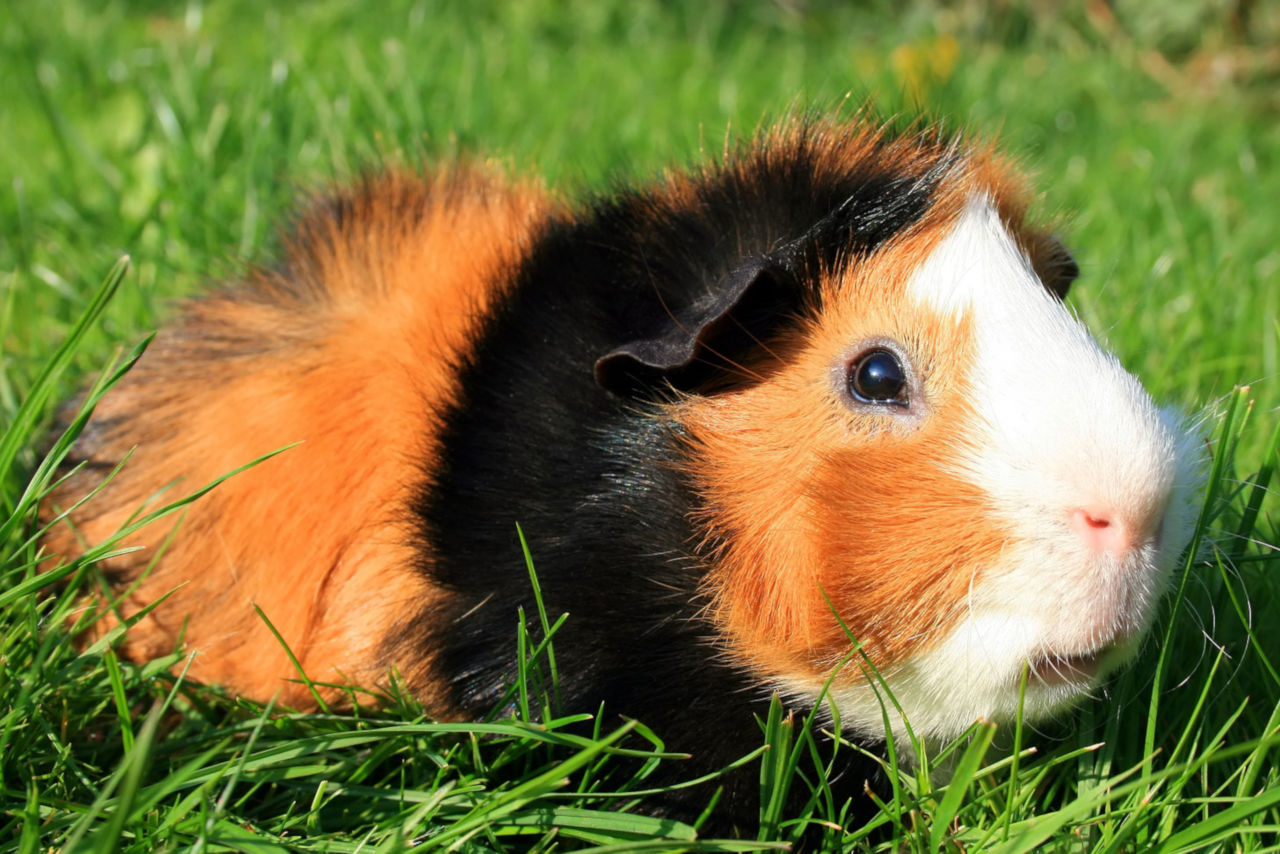Raspberries are edible fruits that are rich in fiber and vitamin C. These nutrients are essential for the proper functioning of the human body. But what about guinea pigs? Can guinea pigs also eat raspberries?
Guinea pigs can eat raspberries because they are an excellent fiber and vitamin C source. However, they also contain sugar, which is not so good for guinea pigs. Therefore, you should only occasionally serve your guinea pigs a tiny portion of raspberries.
Although raspberries are an excellent vitamin C and fiber source for humans, they may not be the best choice for guinea pigs.
You must not give your guinea pigs raspberries daily as they contain much sugar. Too much sugar can cause various health problems in guinea pigs.
This article details how often and how many raspberries you can feed your guinea pigs. We also discuss the benefits and dangers of doing so.
Can Guinea Pigs Eat Raspberries?
Raspberries are entirely safe for guinea pigs in small quantities. They contain a perfect balance of all the necessary vitamins and minerals.
Raspberries are a rich vitamin C and fiber source, which guinea pigs absolutely need.
However, a significant disadvantage of these berries is that they contain a high level of xylitol compared to other fruits, leading to various health issues in guinea pigs.
This raises the question of what health problems guinea pigs can get if they eat too many raspberries.
Let’s learn about some of these health problems that can occur in guinea pigs:
- Hypoglycemia: Hypoglycemia is a condition caused by consuming sugary foods or drinks. It is a condition in which the blood sugar level becomes lower than usual. Hypoglycemia can pose a serious threat to guinea pigs. It can cause severe weight loss and many other problems.
- Stomach upset: Raspberries contain a large amount of sugar and fiber, which can irritate the stomach of our guinea pigs if consumed in excess. An excess of fiber in a guinea pig’s diet can lead to pain, bloating, and cramping, which can be very distressing. Therefore, they should only ever be given a moderate amount of fruit, such as raspberries.
- Urinary tract problems: One of the most essential minerals in raspberries, calcium, can also pose a risk to guinea pigs. The need for calcium decreases as guinea pigs age. At a young age, the calcium requirement for bone formation is higher. However, if adult guinea pigs consume too much calcium, this can lead to various urinary problems such as bladder stones, pain, or infections in the urinary tract.
- Diabetes: Giving guinea pigs too much fruit and treats can lead to diabetes. Raspberries contain a lot of sugar, so they can lead to diabetes if eaten excessively.
Are Raspberries Good for Guinea Pigs?
Yes, raspberries are good for guinea pigs in the right amounts, as they are an excellent source of vitamin C and antioxidants. These help guinea pigs to stay healthy and active.
However, they should not be fed too often or in too large quantities to avoid health problems.
Let’s learn about some of the benefits of raspberries for guinea pigs:
- Prevention of scurvy: Vitamin C is a vital nutrient that guinea pigs need regularly. Raspberries are a good source of vitamin C and can benefit guinea pigs when consumed in moderation. It also helps prevent severe health problems, such as scurvy.
- Improving heart health: Raspberries also help improve guinea pigs’ heart health. According to studies, raspberries are confirmed to be particularly good for heart health. They also help to lower blood pressure, leading to a lower risk of heart attack in guinea pigs.
- Prevention of disease: Raspberries contain powerful antioxidants that lower the risk of disease. Antioxidants play an essential role in protecting the body from critical health problems.
- Hydrates the body: Raspberries contain a large amount of water, which helps guinea pigs stay hydrated. Water is critical for guinea pigs to stay healthy and active. It also helps prevent heat stroke in guinea pigs.
Nutrients in Raspberries
The raspberry is a delicious fruit with a vibrant color and a sweet, juicy taste. It is also an excellent source of minerals, vitamins, and antioxidants.
Let’s take a look at some of the essential nutrients in raspberries:
- Vitamin C: Raspberries are an excellent vitamin C source. Vitamin C, or ascorbic acid, is essential for all body tissues’ growth, development, and repair. It is also an essential nutrient for the body’s immune system.
- Vitamin A: Raspberries contain some vitamin A that contributes to healthy growth. Vitamin A also reduces the risk of a specific type of cancer and prevents other essential health problems.
- Fiber: Raspberries are a rich source of dietary fiber. Fiber is vital for guinea pigs as it contributes to low cholesterol and blood sugar control. They also support the digestive system.
- Magnesium: Raspberries also contain a good amount of magnesium. Magnesium has numerous benefits for the body. It helps prevent nervous disorders and is also effective against type 2 diabetes. It also boosts physical performance and helps fight depression.
- Calcium: Raspberries also contain a good amount of calcium. Calcium is a mineral that is very important for forming bones and tissue.
- Potassium: Raspberries contain a lot of potassium, one of the body’s essential minerals. A potassium-rich diet helps lower blood sugar levels and maintain water retention. Potassium also acts as a protective shield against strokes and helps prevent kidney stones.
- Protein: Raspberries contain a decent amount of protein. Protein has many benefits, as it helps to reduce appetite and hunger pangs. The body uses protein to make enzymes and other chemicals. However, guinea pigs should only ever be given protein in moderation, as excess protein is stored as fat.
How Often Can Guinea Pigs Eat Raspberries?
Giving your guinea pigs raspberries no more than twice a week would be best. But keep the portions in moderation, as moderation is the key to good health.
Raspberries contain a lot of sugar, so overconsumption is a bad idea for guinea pigs.
Raspberries should only ever be an occasional treat for guinea pigs but should not become part of their regular diet.
For a long and healthy life, guinea pigs should eat fresh hay and fresh leafy vegetables daily.
How Many Raspberries Can Guinea Pigs Eat?
Guinea pigs can eat one or two raspberries but no more than twice a week. However, make sure that they are not fed on two consecutive days.
For example, if you give raspberries once on Tuesday, the next feeding of raspberries should not take place before Friday.
Remember that overfeeding raspberries can lead to serious health problems in your guinea pigs as they contain a fair amount of sugar and calcium.
It is recommended that raspberries are generally only served as a treat. Combine them with vegetables such as lettuce, peppers, cucumbers, zucchini, parsnips, and the like.
Herbs such as dill, basil, or coriander are also an excellent choice to accompany raspberries.
This way, you can ensure a balanced and healthy diet for your guinea pigs.
Can Guinea Pigs Eat Raspberry Leaves?
Guinea pigs can eat raspberry leaves because they contain no sugar or other harmful elements.
Raspberry leaves and all other berry leaves are entirely safe for guinea pigs. They contain important nutrients and vitamins that provide many health benefits.
However, before you give your guinea pigs raspberry leaves, you must wash them thoroughly as they may contain pesticides. These can be dangerous for guinea pigs, so be sure to remove them.
Can Guinea Pigs Drink Raspberry Juice?
It is not a good idea to give your guinea pigs raspberry juice. Raspberries contain a lot of sugar and should, therefore, only be given to guinea pigs in moderation.
However, the sugar concentration in raspberry juice is even higher than in the berries themselves. This is not healthy for guinea pigs.
The raspberries themselves should also only be offered as a treat for your guinea pigs once or twice a week.
Can Guinea Pigs Eat Frozen Raspberries?
Guinea pigs can also eat frozen raspberries if they are defrosted and brought to room temperature beforehand.
You must remember that frozen fruit and vegetables can cause stomach problems for your guinea pigs if they are not appropriately defrosted.
Frozen fruit also loses some of its nutrients compared to fresh fruit. You should, therefore, offer your guinea pigs fresh raspberries if possible.
Can Guinea Pigs Eat Dried Raspberries?
Guinea pigs should not eat dried raspberries.
According to studies, dried raspberries contain around five times more sugar than raw raspberries.
Dried raspberries can, therefore, lead to serious health problems.
How Do I Prepare Raspberries for My Guinea Pigs?
To prepare raspberries for your guinea pigs, you can follow some simple steps.
- If possible, buy organic raspberries. These have the advantage that they usually contain significantly fewer or no pesticides.
- Choose one ripe raspberry per guinea pig. Ripe raspberries have a bright color. If the berries have green caps, they are not yet ripe.
- Once you have selected enough ripe raspberries, wash them thoroughly to remove all surface dirt. Make sure the berries are clean.
- After washing, you can cut the berries into small pieces so that your guinea pigs have no problems eating them.
- Finally, you should remove all fruit and vegetable scraps from the cage after the meal to ensure hygiene in the guinea pig household.
Conclusion: Can Guinea Pigs Eat Raspberries?
Guinea pigs are allowed to eat small amounts of raspberries occasionally. Raspberries are an excellent source of vitamin C, potassium, and antioxidants.
However, it is better to serve only one or two berries per animal at a time. An overdose can be a bad idea.
Do not give your guinea pigs raspberries more than twice a week.
You can also offer your guinea pigs raspberry leaves, as they contain no sugar. You can even feed raspberry leaves to your guinea pigs every day.
If the raspberries are not organically grown, wash them thoroughly to remove pesticides and avoid their harmful effects.
Raspberry juice should not be given to guinea pigs as it contains a lot of sugar.
Giving your guinea pigs too many of these berries can lead to significant health problems such as hypoglycemia, heart problems, and urinary tract disease.
It is crucial to keep in mind that guinea pigs should eat fruit only as an occasional treat. Their regular diet consists of hay and a small portion of fresh vegetables.
Overall, guinea pigs can only be given raspberries twice a week in moderate quantities. When appropriately prepared, raspberries have many benefits for them.


